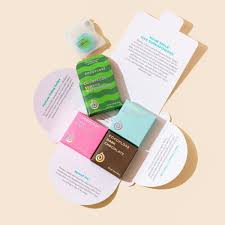
Of the more than 700 species of bacteria mingling in your mouth, some are helpful while others can harm dental and gum health. For Dr. Chrystle Cu, co-creator of Cocofloss, flossing is—and always has been—a non-negotiable. Also non-negotiable for Dr. Cu is her commitment to running a sustainable business.
After years of working in the field of dentistry, she grew saddened and frustrated by her inability to get through to her patients on the importance of regular flossing and brushing. In a decision that would change her life and those seeking alternative oral care, she decided to channel her love for dentistry into other avenues. In 2013, she set out to fulfill her new mission of improving the world’s oral hygiene by creating an effective, motivating, and fun floss that people would be excited to use.
Colorful and attractive packaging was going to be critical to get the anti-flossers to notice and purchase her products. Dr. Cu’s younger sister, Cat, was eager to step away from the grind of a career in finance, go her own way, and indulge her passions for art and design; Cat joined forces with her sister, and by 2015, Cocofloss was born.
In the early days of the business, the team was unsure how to measure their own environmental impact. With so many factors at play—including sustainability certifications, reporting, and environmentally friendly operational and waste management processes—it can be head-spinning figuring out where to start. The Cu sisters of Cocofloss tackled what they felt was the hardest step in the very beginning: simply understanding the importance of caring for the planet and the necessity of including sustainability at the forefront of their business model.
When Cocofloss first started investing in sustainability, they already knew the general principles of reduce, reuse, recycle. They started on the product itself first. Cocofloss is made of recycled water bottles and infused with coconut oil, a natural and soothing antimicrobial. The aromas are crafted in Italy from a combination of natural and synthetic ingredients; all are in full compliance with the strict E.U. regulations on fragrance allergens, and meet International Fragrance Association (IFRA) standards. Once the Cocofloss sisters were confident in their product makeup, they embarked on the next steps in their sustainability journey—a printer who could produce high-end, vibrant, and sustainable packaging.
Moquin, a family-run print shop turned full-service print and packaging manufacturer, has been serving the San Francisco Bay Area for more than 35 years. The company is hyper-focused on investing in sustainable technology and materials in the service of being a reliable partner for its customers. Shared values being key to Cocofloss, they knew the partnership would be a good fit.
To help source the premium, uncoated paper to meet the company’s high sustainability standard, Moquin connected with Monadnock Paper Mills (MPM), the oldest continuously operating paper mill in the United States. Based out of Bennington, NH, the 200-year-old mill marries longevity with its high sustainability profile. All Monadnock materials are FSC Certified (FSC C018866), manufactured carbon-neutral (VERs) and made with 100% renewable Green-e certified wind-powered electricity (RECs) under a third-party certified ISO 14001 Environmental Management System.
Many paper suppliers and printers in the industry market themselves as sustainable because they have an FSC label on their product. While many of these companies are, in fact, pursuing sustainable initiatives, Moquin notes it can be tough to weed out those who rely solely on that FSC label to check the proverbial box.
In an effort to provide a full package of sustainability, Moquin invests in equipment and material to help achieve its goal to be the most sustainable packaging printer in the world. Its latest innovation is Algae Ink, an alternative to traditional black ink (which is made from carbon and generated from fossil fuels). The company also recently invested in a Heidelberg 7 Color that will be manufactured 100% carbon neutral. As part of its continued sustainable efforts, Moquin identified that Heidelberg would be a perfect fit to create one of the most sustainable offset presses in the world.
In addition to ink alternatives, with the help of MPM, Moquin will continue to audit its vendors to ensure their sustainability claims align with their efforts across the supply chain.







